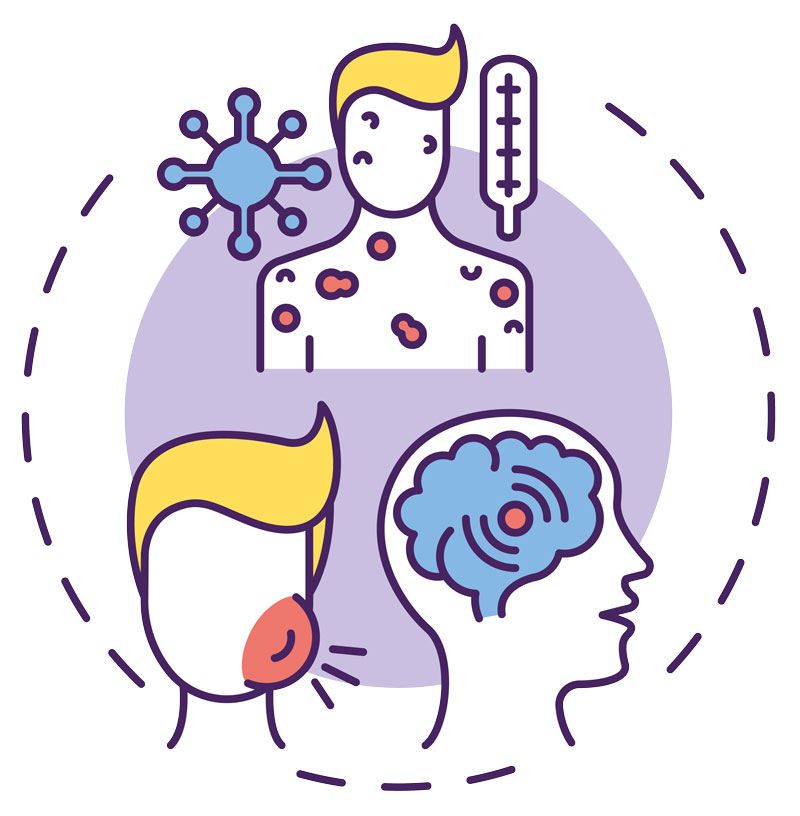Meningitis
Meningitis is an infection of the protective membranes that surround the brain and spinal cord (meninges). It can affect anyone, but most common occurs in babies, young children, teenagers and young adults. Meningitis can be very serious if not treated quickly. It can cause life-threatening septicaemia and result in permanent damage to the brain or nerves. It is estimated that up to 1 in every 10 cases of bacterial meningitis is fatal.
How is it spread?
Meningitis is usually caused by a bacterial or viral infection. Bacterial meningitis is rarer but more serious than viral meningitis. It is usually caught from people who carry these viruses or bacteria in their nose or throat but are not ill themselves, but can also be caught from someone with meningitis, although this is less common. Meningitis can spread through:
- sneezing
- coughing
- kissing
- sharing utensils, cutlery and toothbrushes
Symptoms
Symptoms of meningitis develop suddenly and can include:
- a high temperature (fever) of 38C or above
- being sick
- a headache
- a rash that does not fade when a glass is rolled over it (but a rash will not always develop)
- a stiff neck
- a dislike of bright lights
- drowsiness or unresponsiveness
- seizures (fits)
These symptoms can appear in any order and you do not always get all the symptoms. It is important to seek medical advice as soon as possible if you are concerned that you or your child could have meningitis.
Complications
Most people make a full recovery from meningitis, but it can sometimes cause serious long-term problems and can be life threatening. Complications are rare after viral meningitis. However, studies indicate that up to 1 person in every 2 or 3 who survives bacterial meningitis is left with 1 or more permanent problems.Some of the most common complications associated with meningitis are:
- hearing loss, which may be partial or total
- recurrent seizures (epilepsy)
- problems with memory and concentration
- co-ordination, movement and balance problems
- learning difficulties and behavioural problems
- partial or total loss of vision
- loss of limbs – amputation may be necessary to stop the infection spreading through the body and remove damaged tissue
- bone and joint problems
- kidney problems
Treatment
People with suspected meningitis will usually have tests in hospital to confirm the diagnosis and check whether the condition is the result of a viral or bacterial infection.Viral meningitis will usually get better on its own and rarely causes any long-term problems. Getting plenty of rest and taking painkillers and anti-sickness medication can help relieve symptoms.Most people with bacterial meningitis who are treated promptly will make a full recovery, although some are left with serious long-term problems. Bacterial meningitis usually needs to be treated in hospital; and treatments include:
- intravenous antibiotics and fluids
- administration of oxygen
Additional treatment and long-term support may be required if you or your child experience complications of meningitis. This includes:
- cochlear implants to improve hearing in cases of severe hearing loss
- prosthetic limbs and rehabilitation support may help if it was necessary to amputate any limbs
- counselling and psychological support if the trauma of having meningitis causes problems such as disturbed sleep, bedwetting etc.
For more information click here.
Vaccinations against meningitis
Vaccinations offer some protection against certain causes of meningitis and form part of the GHA Vaccination Schedule. These include:
- Meningitis B vaccine
- 6-in-1 vaccine
- Pneumococcal vaccine –
- Hib/MenC vaccine – offered to babies at 1 year of age
- MMR vaccine Meningitis ACWY vaccine


